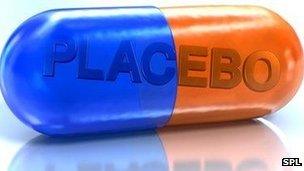'Most family doctors' have given a patient a placebo drug
- Published
- comments

The placebo effect is often explained as the result of patients' faith in the therapy they are given
Most family doctors have given a placebo to at least one of their patients, survey findings suggest.
In a poll, 97% of 783 GPs admitted that they had recommended a sugar pill or a treatment with no established efficacy for the ailment their patient came in with.
The PLOS One study, external authors say this may not be a bad thing - doctors are doing it to help, not to deceive patients.
The Royal College of GPs says there is a place for placebos in medicine.
But they warn that some sham treatments may be inappropriate and could cause side effects or issues such as drug resistance.
For example, one of the placebo treatments identified in the study was antibiotics for suspected viral infections.
Antibiotics are powerless against viruses and doctors are told not to use them.
About one in 10 of the GPs in the study said they had given a patient a sugar pill or an injection of salty water rather than a real medicine at some time in their career.
One in 100 of them said they did this at least once a week.
'Offering reassurance'
Almost all of the GPs said they had provided patients with treatments, like supplements, probiotics and complementary medicines, that were unproven for their medical condition. Three-quarters said they offered unproven treatments on a daily or weekly basis.
Dr Jeremy Howick, co-author of the study that was carried out by the University of Oxford and the University of Southampton, said: "This is not about doctors deceiving patients.
"The study shows that placebo use is widespread in the UK, and doctors clearly believe that placebos can help patients."
The GPs in the study said they used placebos either because patients requested treatment or to reassure patients.
Half said they told their patients that the therapy had helped other patients without specifically telling them that they were prescribing a placebo.
Dr Clare Gerada, chairwoman of the Royal College of GPs, said it was perfectly acceptable to use a placebo as long as it did not cause harm and was not expensive.
"Lots of doctors use them and they can help people.
"If you think about it, a kiss on the cheek when you fall over is a placebo.
"But there are risks. Not all of the placebo treatments that the researchers looked at in this study are inert. If you take too many vitamins, for example, some can cause harm."
She said fobbing off patients with an ineffectual treatment was never acceptable. "But admitting to your patient that you do not know exactly what is going on, but that a therapy might help is."
- Published24 October 2012
- Published19 December 2012